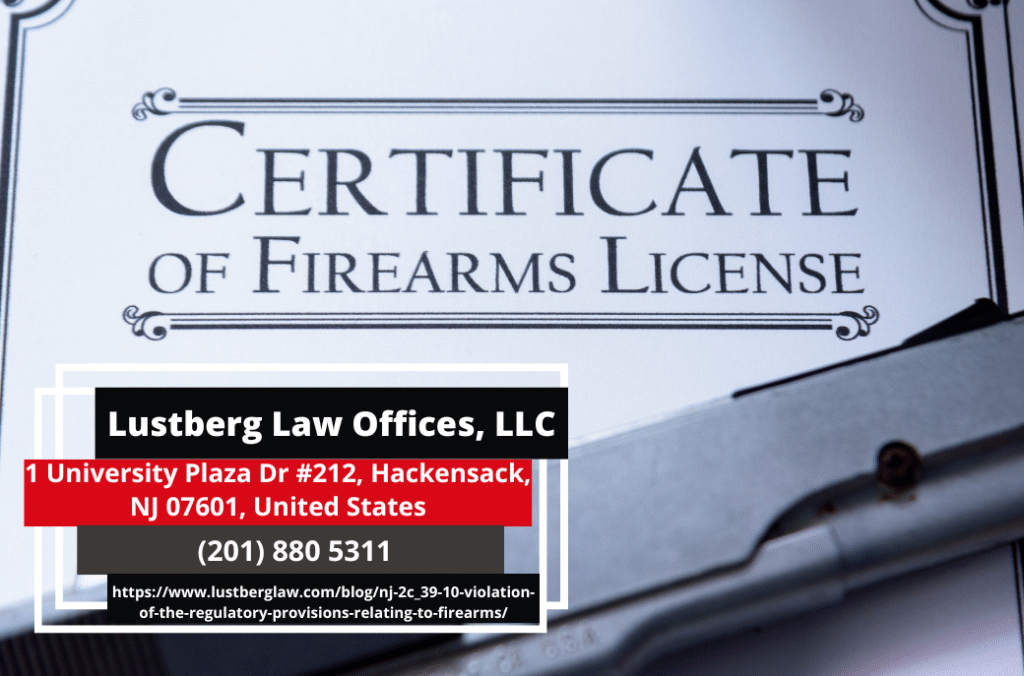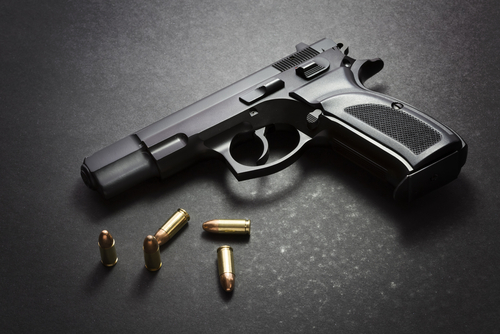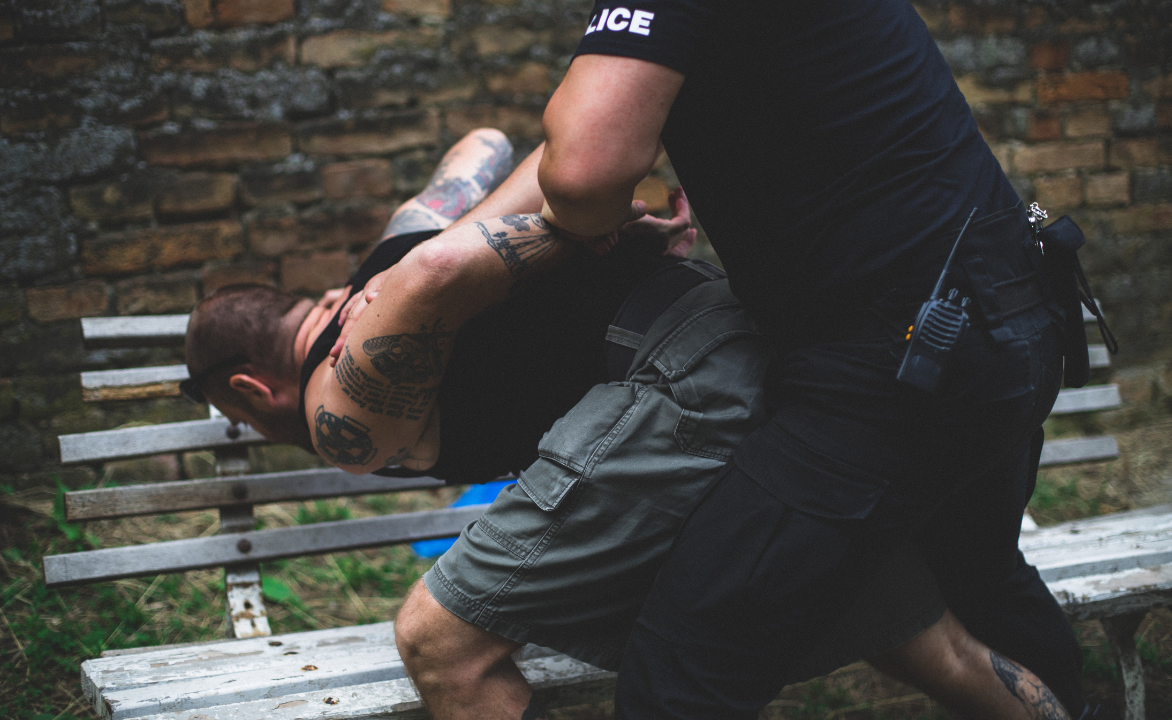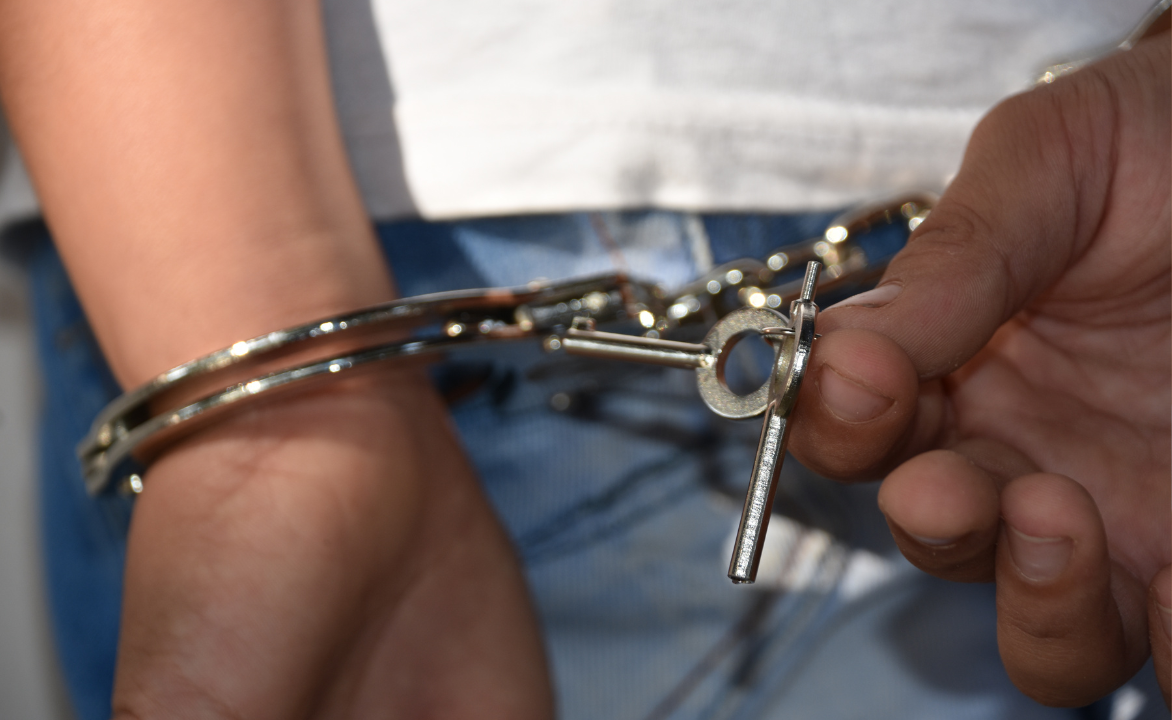New Jersey enforces a wide range of firearm regulations aimed at controlling how guns are purchased, transferred, and possessed. Among these laws is N.J.S.A. 2C:39-10, which focuses on violations of the state’s administrative and regulatory gun provisions. This statute addresses issues like false information on firearm applications, noncompliance with licensing rules, and improper transfers of firearms. While some of these offenses may appear procedural, they can result in criminal charges that carry significant penalties.
If you’ve been charged under NJ 2C:39-10 or are dealing with any firearm-related legal issues, understanding your rights and responsibilities is crucial. New Jersey gun crime lawyer Adam M. Lustberg and our team at Lustberg Law Offices, LLC can help you address these charges and explain your legal options clearly. For guidance and support, call (201) 880-5311 to schedule a consultation. Getting the right information early can make a significant difference in how your case moves forward.
What Is NJ 2C:39-10? (Violations of Firearm Regulatory Provisions)
N.J.S.A. 2C:39-10 is a section of New Jersey’s criminal code that targets violations of the state’s firearm regulatory framework. It covers actions that may not necessarily involve the illegal use of a weapon but instead focus on breaches of administrative, paperwork, and licensing rules. Often referred to informally as the “falsification” statute, this law is designed to uphold the integrity of New Jersey’s strict gun control process by punishing those who lie, misrepresent, or otherwise violate firearm-related procedural requirements.
At its core, this law enforces honest and lawful conduct in all matters related to firearm documentation, ownership eligibility, and lawful transfers. Its full title, “Violation of the regulatory provisions relating to firearms; false representation in applications”, underscores its regulatory nature.
Key Offenses Under N.J.S.A. 2C:39-10 Include:
- Providing false information on firearm applications: This includes lying on forms such as a handgun purchase permit or firearm ID application. It is often prosecuted under the label of “false representation in applications.”
- Violating firearm licensing or permit regulations: Examples include failing to obtain a required permit for possession or a dealer violating state-mandated procedures for firearm sales and transfers.
- Failure to notify authorities as required: Certain gun-related events, such as the loss or theft of a firearm purchaser ID, must be reported to authorities under applicable law. Not doing so may result in a 2C:39-10 violation.
- Illegal transfers to prohibited individuals: Giving or selling a firearm to someone who is legally prohibited from possessing one, such as an underage individual (under 18 for firearms generally, under 21 for handguns), constitutes a serious offense under this law.
How 2C:39-10 Fits Within New Jersey Gun Law
N.J.S.A. 2C:39-10 operates alongside other New Jersey firearm statutes. For example, providing false information on a gun application could also lead to a charge of obstruction of the administration of law under N.J.S.A. 2C:29-1 if the misrepresentation is seen as interfering with a governmental process. Similarly, if someone gains possession of a firearm through fraudulent paperwork, they could also face a more severe charge of unlawful possession of a weapon under N.J.S.A. 2C:39-5.
Ultimately, while many firearm charges in New Jersey relate to illegal possession or use, 2C:39-10 specifically targets misconduct related to the regulatory compliance side of gun ownership and transactions. It acts as a safeguard to maintain transparency, honesty, and accountability in the state’s firearm control system.
Breakdown of Offenses and Penalties Under 2C:39-10
New Jersey law under N.J.S.A. 2C:39-10 covers a range of regulatory violations involving firearms, including false statements on applications, licensing failures, and illegal transfers. The statute is divided into subsections that address different types of misconduct, each carrying specific criminal penalties.
False Information on Firearm Applications (Subsection (c)): Third-Degree Crime
Providing false details on a firearms permit or identification card application is a serious offense in New Jersey. This includes lying about your identity, criminal history, or residency. For instance, if you deliberately omit a past arrest or use a fictitious address on a handgun purchase permit form, you’re violating this statute, often referred to as “false representation in firearms applications.”
- Crime Degree: Third-degree indictable offense (akin to a felony in NJ).
- Penalties: 3 to 5 years in state prison and fines up to $15,000.
- Sentencing Note: New Jersey law typically presumes no incarceration for first-time third-degree offenders, but this presumption can be waived depending on the circumstances.
- Collateral Consequences: A felony conviction can result in permanent loss of firearm rights and difficulty securing employment due to criminal background checks.
Illegally Transferring Firearms to Underage Persons (Subsections (e) & (f)): Serious Felonies
Subsection (e): Transferring Firearms to Individuals Under 18
Selling, gifting, or otherwise transferring a firearm to someone under 18 years old is a second-degree crime unless a legal exemption applies (such as lawful supervised training or hunting).
- Penalties: 5 to 10 years in prison, with a mandatory minimum of 5 years before parole eligibility. Fines can reach up to $150,000.
- Example: If a parent purchases a rifle and gives it to their 17-year-old child outside of legal exceptions, they risk a second-degree charge and mandatory prison time.
Subsection (f): Transferring Handguns to Those Under 21
In New Jersey, you must be at least 21 to receive a handgun. Providing a handgun to someone between the ages of 18 and 20, even a well-meaning gesture, is a third-degree offense.
- Penalties: 3 to 5 years in prison and fines up to $15,000.
- Why It’s Serious: These laws aim to limit firearm access among youth, and even informal transfers can result in severe criminal charges.
Violating Firearms Dealer or Permit Regulations (Subsection (a)): Fourth-Degree or Disorderly Persons
Subsection (a) addresses violations by dealers or private individuals who break the rules around firearm sales, licensing, or record-keeping.
- (a)(1) – General Violations: Knowingly violating licensing or regulatory provisions (e.g., selling firearms without a retail dealer’s license) is a fourth-degree crime.
- Penalties: Up to 18 months in prison and up to $10,000 in fines.
- Penalties: Up to 18 months in prison and up to $10,000 in fines.
- (a)(2) – Record-Keeping Violations by Dealers: Failing to meet specific obligations under N.J.S.A. 2C:58-2 (e.g., not maintaining transaction logs) is a disorderly persons offense.
- Penalties: Up to 6 months in jail and fines up to $1,000.
- Penalties: Up to 6 months in jail and fines up to $1,000.
- (a)(3) – High-Crime Sale Patterns: If a dealer’s firearms are repeatedly used in crimes, the state may revoke their license. This is an administrative penalty rather than a criminal charge.
- (a)(4) – Straw Purchases: Knowingly selling a gun to someone intending to give it to a prohibited person constitutes a second-degree crime.
- Penalties: 5 to 10 years in prison, with a parole ineligibility period of 18 months to 3 years, depending on circumstances.
These provisions emphasize that not only buyers but also sellers must strictly adhere to New Jersey’s firearm regulations.
Failure to Make Required Reports (Subsection (b)): Disorderly Persons Offense
This lesser-known provision requires individuals to notify authorities about certain matters, such as the possession of specific explosive devices or the treatment of gunshot wounds, as outlined in other laws.
- Penalties: Classified as a disorderly persons offense, punishable by up to 6 months in jail and up to $1,000 in fines.
Other False or Fraudulent Firearms Statements (Subsections (d) & (g)): Fourth- and Third-Degree Crimes
Subsection (d): False Registration of Assault Firearms
Lying during the registration of assault firearms, such as misrepresenting ownership during an amnesty or certifying that a weapon has been rendered inoperable, is a fourth-degree crime.
- Penalties: Up to 18 months in prison and fines of up to $10,000.
Subsection (g): Fraudulent Handgun Purchase Exemption
New Jersey limits individuals to purchasing one handgun per 30 days. Those who lie to obtain an exemption from this rule, such as by misrepresenting their reason for multiple purchases, commit a third-degree crime.
- Penalties: 3 to 5 years in prison and up to $15,000 in fines.
- Sentencing Note: This specific offense removes the usual presumption against incarceration for first-time offenders, making jail time more likely.
New Jersey’s 2C:39-10 statute is far-reaching and designed to reinforce the state’s tight control over firearms through both criminal and administrative penalties. Whether the offense involves false paperwork, illegal transfers, or procedural violations by dealers, the law treats regulatory compliance as a matter of public safety, not a mere technicality.

Common Defenses to N.J.S.A. 2C:39-10 Charges
Charges under N.J.S.A. 2C:39-10 can carry serious consequences, but various legal defenses may apply depending on the circumstances. These cases often involve regulatory violations rather than acts of violence, which means courts may consider mitigating factors and legal nuances.
Lack of Intent or Knowledge
Many charges under 2C:39-10 require that the defendant acted “knowingly” or with the intent to deceive. If the misstatement on an application was an honest mistake, such as forgetting about an old out-of-state conviction or misunderstanding a question, there may be no criminal intent.
For example, a person who omits a decades-old charge from another state may not have done so deliberately. Demonstrating a lack of intent can lead to reduced charges or dismissal.
False or Unproven Allegations (Insufficient Evidence)
The burden is on the prosecution to prove all elements of the offense beyond a reasonable doubt. If the alleged false statement is actually true or was entered by mistake by someone else, or if the facts about an illegal transfer are unclear or unsupported, the defense can challenge the strength of the evidence. This strategy may involve questioning witness credibility, disputing documents, or showing that any error was not attributable to the defendant. A weak or conflicting case often opens the door to dismissals or better plea offers.
Statutory Exceptions or Lawful Purpose
New Jersey’s firearm laws include narrowly defined exceptions. For example, a minor may legally handle a firearm during supervised activities like hunting or target practice. A parent who allows a 17-year-old to shoot at a licensed range under direct supervision may fall under these exceptions. Similarly, certain regulatory offenses may be excused if the defendant reasonably relied on a valid exemption or permit. If the defense shows the activity was within legal bounds, the charges may be dropped.
Entrapment or Coercion
In rare cases, defendants may argue they were pressured or manipulated into committing a violation. Entrapment occurs when law enforcement induces someone to commit a crime they otherwise wouldn’t have committed, such as persistently urging a gun transfer until the person relents. Coercion or duress applies when someone commits an offense due to threats or pressure from another individual. While difficult to prove, these defenses can support efforts to reduce or dismiss charges, particularly when intent is in question.
Procedural or Constitutional Challenges
Any misstep by law enforcement can lead to a successful procedural defense. For example, if authorities obtained firearms, applications, or statements through an unlawful search or without properly advising the defendant of their rights, the resulting evidence may be inadmissible. Suppression of key evidence often forces prosecutors to reduce or drop charges. In less severe cases, first-time offenders may qualify for Pre-Trial Intervention (PTI), which can result in no criminal conviction if the program is successfully completed.
| Defense | Description |
|---|---|
| Lack of Intent or Knowledge | Applies when the defendant did not knowingly provide false information or made an honest mistake, such as forgetting an old conviction. |
| Insufficient Evidence | Challenges the prosecution’s case by showing the alleged falsehood was true, mistaken, or unproven; emphasizes reasonable doubt. |
| Statutory Exceptions | Applies when conduct is allowed under specific legal exceptions, such as supervised use by a minor or a valid permit exemption. |
| Entrapment or Coercion | Argues that the defendant was induced by law enforcement or pressured by others into committing the offense against their will. |
| Procedural Challenges | Focuses on violations of the defendant’s rights, such as unlawful searches or failure to give proper legal warnings. |
Protect Your Rights with Legal Help from Lustberg Law Offices, LLC
Being charged under N.J.S.A. 2C:39-10 can be overwhelming, especially with the potential for prison time, fines, and a lasting criminal record. Whether the issue involves a permit application, a transfer violation, or another regulatory matter, it’s important to understand the stakes and what defenses may apply.
Lustberg Law Offices, LLC has extensive experience with firearm-related charges under New Jersey law and provides strategic guidance for those facing violations of N.J.S.A. 2C:39-10. We can review the facts of your case, identify potential defenses, and work to reduce the impact of the charges you’re dealing with. From challenging false allegations to negotiating plea agreements or seeking entry into diversion programs, the team is prepared to help you pursue the most favorable outcome. Call us today at (201) 880-5311 to speak with a trusted New Jersey gun crime lawyer.






